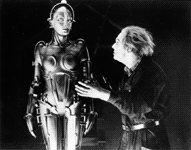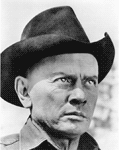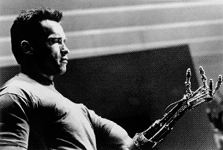DRAWING CLASS • TEN
DRAWING CLASS
Cantankerous Crumb—director Terry Zwigoff has been maintaining a pretty low profile since his documentary on legendary underground comix guru Robert Crumb and the family circus that surrounds him topped critics’ lists in back in 1995. It’s not that the San Francisco—based Zwigoff hasn’t been in demand in the interim; in fact, Woody Allen first approached Zwigoff about directing what became Barbara Kopple’s Wild Man Blues, but Zwigoff wanted final cut, and Allen balked, then walked.
Control is an issue for the fiercely independent Zwigoff, whose new project, a big-screen adaptation of Daniel Clowes’s Ghost World – a series of emotionally dour but ethnographically dead-on episodes in the lives of two late-teenage girls that originally appeared in Clowes’s comic book Eightball – is, after five years in development, finally in production.
Clowes and Zwigoff wrote the screenplay, which departs substantially from the comic strip, and Zwigoff held out for the best possible production deal. American Beauty’s Thora Birch and Manny and Lo’s Scarlett Johansson star, along with Brad Renfro and Steve Buscemi, and the film is being lensed by All About My Mother’s Affonso Beato. Longtime Zwigoff collaborator Lianne Halfon is producing, along with John Malkovich, and the cash flow is coming from Granada UK, with MGM-UA coming in for the negative pick-up.
"It’s the king’s life here in Hollywood," says the refreshingly snide Zwigoff. "I love barking at production assistants and scaring them out of their minds just so they’ll bring me a pencil."
Move over, Mr. Natural – the big time is dead ahead.
(Dan Clowes’s graphic novels can be purchased from Fantagraphics. 1-800-657-1100, www.fantagraphics.com) – Chuck Stephens
 |  |  |
| left to right: Brigitte Helm and Rudolf Klein-Rogge in Metropolis, Yul Brynner in Westworld,
Arnold Schwarzeneggar in Terminator 2: Judgement Day/courtesy of the L.A. County Museum. | ||
One of man’s most enduring fantasies is to realize perfection. In mythology this is often achieved by competing with the very gods who endow one with life, in an effort to become more godlike oneself. In science man often supplants the notion of God with a grand "unifying theory" – or a surgical nip and tuck – but the end result is more or less the same. Since its inception, the cinema has often reflected these twin impulses – and just as frequently conflated them in the popular genre of science fiction. Indeed, in many ways, cinema itself can be viewed as the mad scientist of popular culture, employing its arsenal of optical illusions and special effects to breathe life into more-perfect creatures – stars and monsters alike – who emerge from our collective unconscious.
From May 18 through June 10, the Los Angeles County Museum presents "Artificial Humans in the Cinema." The series, derived from a major retrospective which screened at this year’s Berlin Film Festival, includes films exemplifying the twin pillars of the "artificial human" genre: the mad scientist who challenges the natural order by playing God, and the utopian vision of a society populated by men whose superior strength and intelligence are machinelike in their perfection. Monster or robot? Eugenics or electronics? Whatever the means, the utopian dream gives way to disorder and paranoia.
Among the archival treasures included in the series are Der Golem (1920), a precursor to James Whale’s 1931 Frankenstein, in which a rabbi shapes and animates an avenging angel out of clay; and The Stepford Wives (1975), which exploits America’s incipient fear of feminism by taking the concept of the perfect woman to its logical, horrifying, conclusion.
In conjunction with the film series – programmed by Ian Birnie together with Wolfgang Jacobsen and Martin Koerber of the Filmmueum Berlin—Deutsche Kinemathek – a day of lectures, entitled "Enhancing the Human: Science Fiction, Genomics, and Ethics Collide," has been organized by the Goethe-Institut, Los Angeles, with the U.C.L.A. Program on Medicine, Technology and Science. (For information or to purchase a catalogue, call 323-525-3388.) – S.G.
VOD CALENDAR


 See the VOD Calendar →
See the VOD Calendar →



